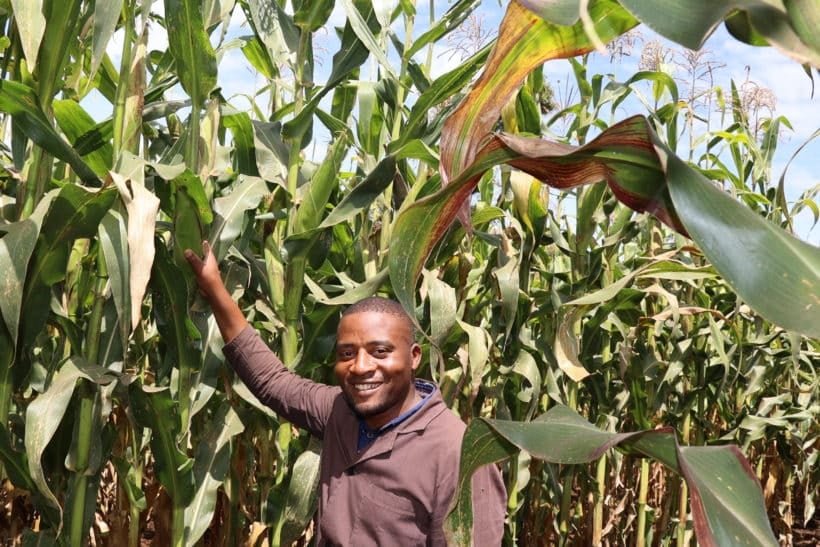
Last month, scientists warned of a looming “phosphogeddon.” They worry that the world’s misuse of phosphorous may exacerbate the fertilizer crisis, further disrupting global food production and worsening hunger emergencies in Africa and elsewhere.
There is one small insect whose powers could be harnessed to help avoid “phosphogeddon” and address the fertilizer crisis: the black soldier fly. It is not a pest or disease vector—the adults can’t even bite. But the larvae are a different story. Their voracious appetites offer the opportunity to recycle bio-waste into organic, high-quality fertilizer, while also contributing to waste management and animal feed.
This could help solve many of the world’s challenges. Fertilizer supplies tightened and prices skyrocketed in the months following Russia’s invasion of Ukraine—tripling in sub-Saharan Africa. This further squeezes the continent’s farmers, many of whom are already coping with drought, while others contend with flooding, and most struggle to grow food in depleted soil. Meanwhile, higher fertilizer prices also push up the price of food, making regular meals unaffordable for millions of people. Over the last year, 60 percent of people in East Africa and 40 percent in West Africa faced chronic hunger.
Chemical fertilizers cannot meet the continent’s needs. They have always been too expensive and inappropriately formulated to serve the legions of smallholder farmers in African countries. Today, Africa only accounts for 3-4 percent of global fertilizer use. In addition, synthetic fertilizer use is carbon intensive, contributing significantly to climate change, the biggest threat to African agriculture. Production of ammonia alone—the world’s most-used nitrogen fertilizer—accounts for as much as 1-2 percent of global carbon dioxide emissions.
Africa needs local solutions that can regenerate soil health in the face of climate change—while helping abate it. The black soldier fly could be one such solution. When its larvae feed on waste, they produce a byproduct called frass. It consists of whatever original waste is left over, insect feces, and the larvae’s cast-off skins. While it certainly doesn’t sound appealing to human ears, this organic material is akin to a wonder drug for soil.
It can be further treated to give a high-quality, nutrient-rich fertilizer with the ability to improve soil health, boost crop yield and nutritional quality, suppress pests and diseases, and increase farmer profit margins.
Saprophytic insects—those feeding on nonliving organic matter—such as black solder flies take only five weeks to recycle organic waste into high-quality organic fertilizer that has more nutrients than most existing commercial organic and synthetic fertilizers. Studies by the International Centre for Insect Physiology and Ecology have shown that frass fertilizer can increase the yields of key crops, including maize (7 – 27 percent), tomatoes (22 – 135 percent), and French beans (38 – 50 percent) compared to existing commercial fertilizers.
Frass fertilizer is also less expensive than synthetic fertilizers. It costs US$854 per hectare every season to fertilize with synthetics, but only US$390 per season using frass fertilizer over the same area. Furthermore, frass fertilizer has been found effective in suppressing devastating crop pests such as potato cyst nematodes, root knot nematode, and cabbage and onion root maggots, as well as tomato bacterial wilt disease.
And there is another upside to frass fertilizer: it puts abundant waste to good use. Africa’s bio-waste generation capacity of 125 million tons annually provides sufficient grist for insect farming and frass fertilizer production. Currently, only 4 percent of waste in Africa is recycled, compared to 35 percent for Europe.
The time is ripe for private capital investments in African agribusinesses that can increase the production of frass fertilizers. Cutting-edge research is critical to fine tune production and optimization, build capacity, and generate the information necessary for commercialization.
The world needs to embrace the urgency of the fertilizer crisis and think beyond outdated or expensive technologies that are unaffordable to many farmers. Such investments, and enabling government policies, are essential for solutions such as frass fertilizer to take hold, helping producers ensure consistent supply to meet the growing demand.
The world has the tools—and the bugs—to develop sustainable, local solutions that improve soil health and human health, as well as food security and nutrition. When farmers can use these tools in their fields, we can solve many challenges at once, improving African lives and livelihoods in the process.
Dr. Chrysantus Mbi Tanga is a Senior Scientist and the Head of Insects for Food, Feed and Other Uses (INSEFF) Programme at icipe. Betty Kibaara is a Director, Food Initiative at The Rockefeller Foundation, Africa Regional Office.

